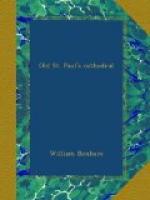The word Dean belongs to the ancient Roman law, Decanus, lit. one who has authority over ten, as a centurion was one who had authority over a hundred. The Deans seem originally to have been especially concerned with the management of funerals. Presently the name became adopted to Christian use, and was applied in monasteries to those who had charge of the discipline of every ten monks. When the Abbot was absent the senior Dean undertook the government; and thus it was that in cathedral churches which were monastic it gradually became the custom to have one who acted as Dean, and this system was gradually adopted in secular cathedrals, like St. Paul’s. In monasteries, however, the Dean was so far subordinate to the Prior that he had charge of the music and ritual, while the Prior had a general superintendence.
The clergy of St. Paul’s then were seculars. There were thirty of them, called Canons, as being entered on the list ([Greek: kanon]) of ecclesiastics serving the church. Each man was entitled to a portion of the income of the cathedral, and therefore was a “Prebendary,” the name being derived from the daily rations (praebenda) served out to soldiers. There were thirty Canons or Prebendaries attached to St. Paul’s, and these with the Bishop and Dean formed the Great Chapter. To them in theory belonged the right of electing the Bishop; but it was only theory, as it is still. The real nominator was the Pope or the King, whichever happened at the crisis to be in the ascendant.
In early days the Bishop was the ruling power inside the cathedral. At its first foundation, as we have seen, it was the Bishops who exerted themselves to raise the money for the building. But as time went on the Bishops, finding their hands full of affairs of state, stood aside in great measure, retired to their pleasant home at Fulham, and left to the Dean greater power. And thus it was that, as we have already told, Dean Ralph de Diceto built the Deanery. And thus gradually the Dean became practical ruler of the cathedral—the Bishop had no voice in affairs of the Chapter, except on appeal. And it is a curious fact that the Canons attempted to exclude the Dean from the managing body, as having no Prebend. He could expel from the choir, and punish the contumacious, but they contended that he had no power to touch the revenues. It was because of this that Bishop Sudbury (1370), in order to prevent the scandal of the Dean being excluded when the Chapter were discussing business, attached a prebendal stall to the Deanery, and thereby enabled him to preside, without possibility of cavil, at all meetings of the Chapter.




